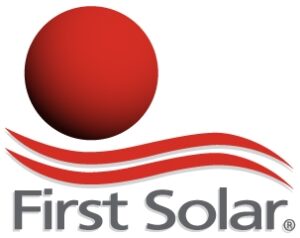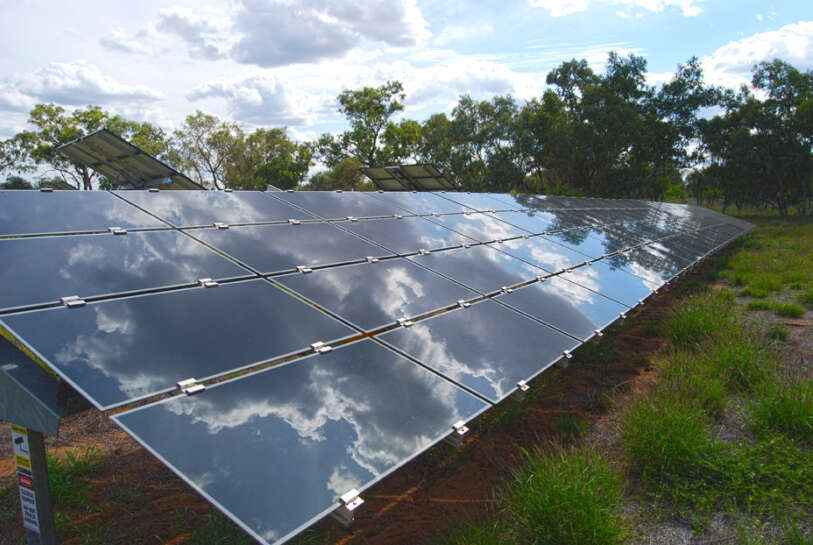| Manufacturer | First Solar |
|---|---|
| Array Rating | 6.96kW |
| PV Technology | CdTe |
| Array Structure | Fixed: Ground Mount |
| Installed | 2008 |
View on Map Graphs Download Data
Current Output

Cadmium Telluride thin-film array, fixed ground-mount
Cadmium Telluride (CdTe) replaces silicon as the active photovoltaic material in this array. This is a thin-film technology, and the active material is deposited in a thin layer on the panel’s substrate.
Less photoelectric material is consumed in the production of thin-film panels, which can allow lower manufacturing costs. The manufacture of CdTe thin-film panels has the potential to be a simpler process than for other thin-films, which could also lead to lower costs.
CdTe panels have a lower efficiency than some Silicon based technologies, meaning more panels are needed for a given output. However, CdTe performs better in some solar conditions, as this photovoltaic material can absorb light at a lot of different energy levels. CdTe also performs well in hot conditions.
As a new technology, research is continuing to improve the performance of CdTe panels and to refine the manufacturing process.
* These CdTe Thin Film modules were originally shipped and rated by the manufacturer for installation in Europe, and were supplied and installed to DKASC without the integrator having gained manufacturer approval.
| Array Rating | 6.96kW |
|---|---|
| Panel Rating | 73W |
| Number Of Panels | 96 |
| Panel Type | First Solar FS-272* |
| Array Area | 69.12 m² |
| Type Of Tracker | N/A |
| Inverter Size / Type | 6 kW, Fronius Primo 6.0-1 |
| Installation Completed | Mon, 3 Nov 2008 |
| Array Tilt/Azimuth | Tilt = 20, Azi = 0 (Solar North) |

Notes on the Data
-
System Disconnection for Cabling Works
All arrays at the Solar Centre were disconnected from approximately 2.00pm to 3.00pm on Monday, 9 July 2018 in preparation for the cable between the main switchboard and distribution board being upgraded. Array sites #23-38 remained disconnected while the main feeder cable to these sites was replaced in subsequent days, but all systems were re-connected by early afternoon on Thursday, 12 July 2018.
-
Site 7: New Fronius Inverter
A new Fronius Primo 6.0-1 inverter has replaced the SMA Sunny Mini Central 7000HV that reached its end of life. The PV array module type and capacity remains unchanged. This is the first string inverter at the DKASC which is a non-SMA model, although alternative branded microinverters have been used on other arrays.
-
Site 17: Inverter Failure
On the 20 January 2018, at site #7’s First Solar CdTe array, the SMA SMC 7000HV inverter failed. The cause appears to be catastrophic failure of the PCB nearest the DC intake. This unit shall be replaced as soon as possible.
-
Site 7: DC Isolator Installation
Array 7 was disconnected during around 1.00-4.30pm today while a new DC isolator was being installed.
-
Monitoring Interruption for UPS Battery Replacement
The disconnection and re-connection of the solar arrays and weather station equipment while a new site connection was being established prompted the already flattening UPS batteries which power the site’s energy meters to fail and require immediate replacement. Data recording was affected from approximately 2.30pm ACST, Monday 10 July to 4.00pm, Wednesday 12 July.
Affects weather data for DKASC, Alice Springs
-
Site 7: Operational Again
The failed inverter at Site 7 was replaced today. Normal operation of the system should commence again from 9th June 2016.
-
Site 7: Fault
This PV system shutdown on the 13/11/2015. Early investigations indicate that the system inverter has failed. Further investigations are underway and the inverter shall be replaced if this is determined to be final cause.
-
Site 7: Disclaimer
These CdTe Thin Film modules were a non-approved production prototype and are not commercially available. The data is not representative of current CdTe Thin Film technology and data from this site should not be used in any comparative capacity or in any marketing materials.
> Answer to Spotlight Question
Onsite at the DKA Solar Centre in Alice Springs are a series of quiz-like Spotlight Questions at each array. Visit the centre and scan the QR code at each sign to test your knowledge – and check your answer here!
Q: What are the environmental pros/cons of using cadmium and telluride as raw materials?
A: Cadmium is a toxic substance that is considered hazardous, and tellurium, a rare element, is also mildly toxic. However, the compound CdTe that they form together is deemed to be safe and stable. Photovoltaic CdTe can be produced by recycling the toxic by-products of mining, copper refining and other metal production processes, which may otherwise end up as hazardous landfill. The raw materials from the old modules themselves can also be safely recycled.
